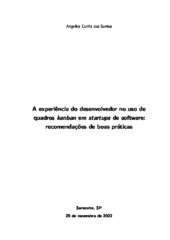A experiência do desenvolvedor no uso de quadros kanban em startups de software: recomendações de boas práticas
Resumen
Software startups are organizations that usually have few human or financial resources,
suffering from the time pressure exerted by the market. To face the difficulties and have the
flexibility that the market requires, startups intend to adhere to agile software development
practices. One of the tools to support agile practices frequently present in this type of
organization is the kanban board. This board can be physical or virtual, its function is to
display the workflow and status of tasks in a simple way, containing columns to represent
the status and cards to represent the tasks, making its use well spread by software startups.
Even though the kanban board is considered easy to use, some difficulties can be faced by
software developers when using it, such as: problems in finding some information, difficulties
in understanding the scope and lack of standard can affect the developer experience ,or
DX, and consequently affect the performance and the work developed. From this, the
general objective of this project was to carry out an investigation on the characteristics
of virtual kanban from the perspective of startup professionals, seeking to understand
how the characteristics of the virtual kanban board affect DX, and how this experience
impacts the characteristics of startups .At the end, a guide called KanbanGuide4Startups,
is proposed, consisting of recommendations to help software developers in startups to use
the board. To execute this investigation, the DX framework was used, the characteristics
that startups have, and the characteristics of the kanban board they need to have. Initially,
a study was carried out in the literature to understand the main topics of this work. An
exploratory study was conducted to identify how the virtual kanban board is used in
software startups and how it affects the developer experience and software startups. For
this, a qualitative analysis was performed on kanban boards and through interviews with
developers. The results showed eight key aspects arising from the use of the virtual kanban
board that impact the developer experience and the characteristics of startups. A study of
the virtual kanban board tools was also conducted, where the objective was to understand
how these tools are able to meet the requirements of good practices that the kanban board
must have. KanbanGuide4Startups, was proposed considering the results of the eight key
aspects found in the exploratory study and the study of tools. The guide was evaluated
by four startup development professionals. The evaluation took place through interviews
seeking to collect perceptions in relation to the recommendations. The results showed that
in the perception of experts, the recommendations are viable for the startup context as
long as there are no exaggerations when applying them.
Colecciones
El ítem tiene asociados los siguientes ficheros de licencia:

